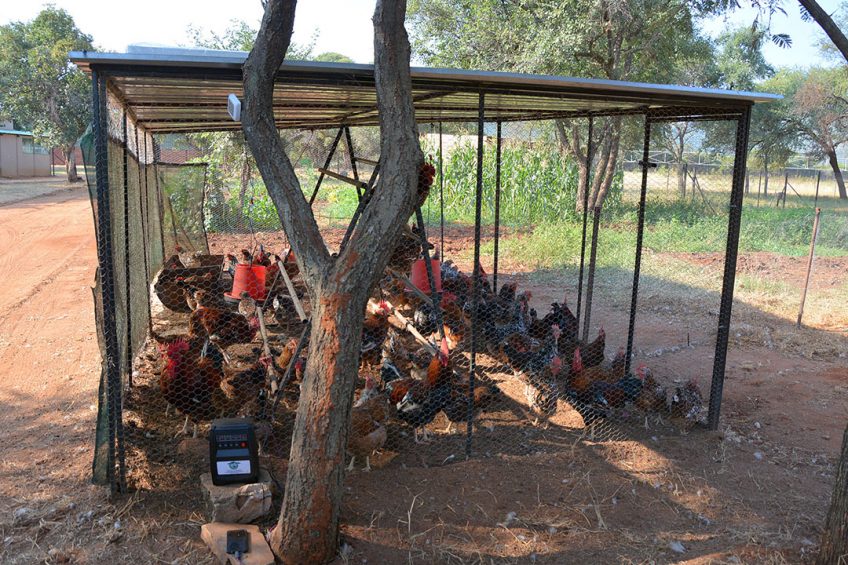Strong demand for mixed day-old chicks in South Africa

The coronavirus lockdown in South Africa really brought the country to a halt. However, for South African chicken producer Mike Bosch business was brisk. He saw an increase in demand for mixed day-old chicks.
Originally from Zimbabwe, Mike runs his own poultry breeding business in Bela-Bela, a town in the Limpopo Province of South Africa. Since having bred his own indigenous free-range bird called the Boschveld over 20 years ago, Mike has enjoyed huge success exporting his chickens all over Africa. The Boschveld chicken is a 3-way cross between 3 indigenous African breeds: Venda, Matabele and Ovambo, in a ratio of 50%, 25% and 25%, respectively. The breed Mike created has become very popular throughout the African continent with its distinctive red and brown colour with white feathers in between.
There are now over 2 million of these birds in existence thanks to the breed’s characteristics of being resilient to the toughest conditions the continent can throw at them.
Package for smallholder farms
Mike developed a new package that included 10 birds and a small chicken coop to sell to small farmers and anyone who wants to produce their own eggs and poultry meat. This became a huge success and was exported to 17 African countries, but since the coronavirus struck, the export market has all but disappeared. Mike is now concentrating on the home market, which has excelled, particularly so for mixed day-old chicks. Mike said: “The Boschveld chicken is bred purely for hardiness and health. They survive and produce on what nature can provide, with only a small amount of maintenance feed to boost production. Africa can be a tough place to exist, particularly with varying climatic conditions, so we needed a breed that could adapt to the weather changes.”

Keeping chickens in free range conditions
“Chickens in Africa are kept in free range conditions and need to keep producing in these conditions,” Mike continues. The birds on Mike’s farm are tested every 3 months for bird flu and salmonella and are vaccinated for the regular diseases, such as Newcastle disease, Gumboro disease and coccidiosis. “I am still farming at Bela-Bela with the Boschveld chickens and currently have about 27,000 birds in various stages on the farm,” said Mike. “Overall the chickens are selling well even during this coronavirus period, boosted by sales of the younger birds.”
 Coccidiosis
Coccidiosis
Find out more about the causes and effects of coccidiosis and many other poultry diseases in our health tool.
Deciding to stop sexing day-old chicks
“6 months ago I took the decision to stop sexing my day-old chicks. As more customers preferred only hens, the rooster sales sometimes were not so good and I was being left with too many males. I thought stopping sexing the chicks would have a detrimental effect on my sales, but no, the opposite happened. Customers now buy mixed day-olds and I can’t keep up.” The mobile coop is selling well but customers just buy the coop as they don’t want the other equipment.” Mike used to sell solar panels and LED lights with the coop but these extra items are not so popular anymore. “Now I am only selling locally because of lockdown. Nothing is being exported out of the country from the farms now.”
 Funding support for chick sexing company
Funding support for chick sexing company
One of the world’s leading companies looking into overcoming the controversial issues of male chick culling has been awarded € 2.5m from the European Union.
Anticipating high fertile egg sales
Mike has around 24,000 eggs in the incubators at the moment and is anticipating high fertile egg sales. Mixed day-old chicks are selling for R12 (US$ 0.69) each; fertile eggs at R8 (US$ 0.46) each; point of lay chickens at R115 (US$ 6.63) each; and 4 week old birds at R49 (US$ 2.82) each. “The lockdown has caused all exports to stop because of closed borders and no air transport,” said Mike. “However, on the plus side the local demand for eggs and chickens has shot up. The pandemic has bought a lot of future orders for export into other countries in Africa. I will have to play my cards right between local and export sales, when the borders open up, as I need them both. With times like this you come to realise exactly what you can make happen with limited resources. There are a lot of fantastic opportunities coming in food production in Africa after all this is over.”
Mike thinks his type of poultry farming is going to take off. “I have already been approached by a few big international NGOs to assist in Africa with developing food production. After the lockdown they will come to meet me to see how we can help each other. Locally, right now, there is a huge poverty relief training programme going on, with 1000 mobile chicken coops, teaching people how to rear their own birds,” he added.
Disease control
In terms of disease control and the dreaded bird flu Mike said the area has a good biosecurity status. “There is no bird flu in our province,” he said. “Recently I was introduced to a new disinfectant product called ADI and it did wonders for the health of my chickens. My mortality rate dropped by 90% which is an extremely good result for my farm.”












